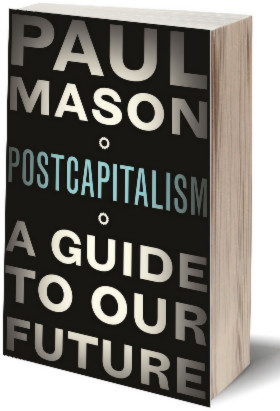 Apologies for lateness! Paul Mason’s book PostCapitalism: A Guide to our Future came out in 2015. However it wasn’t until the victory of Donald Trump that I realised how important it was. Do yourself a favour: grab a copy of this book and get familiar with the mess we’re in. Come to terms with the fact we won’t be saved by Bernie Sanders, yet alone Hillary Clinton.
Apologies for lateness! Paul Mason’s book PostCapitalism: A Guide to our Future came out in 2015. However it wasn’t until the victory of Donald Trump that I realised how important it was. Do yourself a favour: grab a copy of this book and get familiar with the mess we’re in. Come to terms with the fact we won’t be saved by Bernie Sanders, yet alone Hillary Clinton.
That said, it’s not a grim read. Quite the opposite. I remember thinking so furiously as I was reading it that my internal discussions kept drowning out the text. It was like singing along (albeit terribly) to a new favourite song. I’ve never experienced anything quite like it. It didn’t really matter whether I was agreeing or disagreeing with what he saying (I was doing a bit of both); it was just bloody good fun.
No matter who you are, you’ll find ideas in the book you haven’t come across before. Some of them are original; others are extensions upon the thinking of others (Mason is honest and even generous in crediting other people). But at heart this book is an ingenious work of synthesis by a diligent and searching mind. Above all else, it’s the work of a worker. Paul Mason may be an academic but he’s a journalist at heart, and this book is solid graft rather than canny expropriation. So, yes, I’m recommending it. Absolutely. But is he right?
I’d like to suggest this question misses the point. Mason is not trying to sell us a new left programme here. He is quite explicit about this, although a couple of precious reviewers seem to have skipped over that bit. Rather, Mason is trying to get older activists, and younger folk with no particular analysis, to move beyond the usual old chestnuts and regenerate their theory in the light of very real changes in capitalism, and 21st century practices of opposing it. Marx would have loved it.
Speaking of He Who Must Not be Named, this book includes a fine resurrection of the labour theory of value, as well as a searching discussion on the obscure ‘Fragment on Machines’. But Mason does not do this just to justify or vilify the theory. His concern is to show that it can be useful, and that its use value may have been overlooked for spurious reasons. Like all the other ideas and theories he presses into service here, the aim is to explain what is happening – why it is kicking off everywhere – rather than seeking to justify some kind of position he has taken.
It has been said that ‘the left’ has predicted twenty out of of the last five crises of capitalism. It is an economic system that has been confounding its critics for decades, reinventing itself and even thriving on the challenge. Mason is no inevitabilist in this regard; he even suggests what neo-liberals might do to dig their way out of the current malaise. But the solution is temporary and it’s not pretty. We are only just beginning to see this with the advent of #NotMyPresident Donald Trump. Both this and Brexit fit perfectly with the trajectory Mason predicts as capitalism casts around for another transfusion. We may be in for another ten years, perhaps even fifty, but for reasons that Mason explains at length, there won’t be another rejuvenation. Give or take an epoch of authoritarianism, rising inequality and economic stagnation, capitalism can no longer deliver.
We may not have noticed it, yet alone articulated the experience, but the solution has been developing right under our noses. Like the black market that developed in the fault lines of Soviet socialism, a postcapitalist economy has been bootstrapping itself out of ingenuity and necessity. As austerity bites deeper we have seen the rise of non-market collaborative ventures, crowd-funding, time banks, the open-source movement and informal sharing agreements, alongside a networked renewal of co-operatives, not-for-profit enterprises, democratic workplaces and credit unions.
“Now, alright, this seems like a very fragile and uncertain thing on which to base a new system. But so did banking in the age of of Kings, who could behead bankers. Basically, things can change. Postcapitalism is the system that will emerge if we suppress monopolies and let prices of information and things fall, and if we radically de-link work from wages, and if we then nurture that part of the economy where free, shared and socially-produced things are replacing money and market forces.”
(Paul Mason: https://www.youtube.com/watch?v=MEzSzptjS40)
In other words, it is not us who is stuck with the neo-liberal model. It is not us who have everything vested in its success. Nor need we settle for austerity. And we certainly needn’t wait around for a vanguard party to save us. We can shift our efforts to building a democratic economy immediately, by consciously and deliberately nurturing an alternative that is already taking off. We can embrace the techniques of the networked social movement and create the future now, while the current system splutters and grinds to a halt.
A bit sketchy? Don’t listen to the tone-deaf git that’s singing along with the record. Read this book for yourself!
(Psssst! If the video above doesn’t load and/or there’s just no way you can afford to go about buying books, and if you’re just not that keen on reading anyway, you’ll find a good summary here. If you can get your head around this you could probably bluff yer way through the exam.)

















